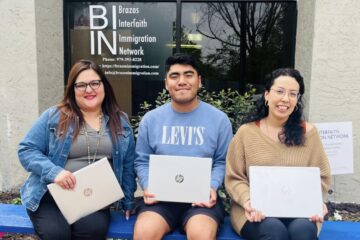Partner Spotlight: St. Thomas Episcopal Church

Many of BIIN’s community partners over the years have been faith-based organizations. BIIN itself was created by people who had witnessed the frequency with which low-income immigrant neighbors appealed to local churches for help in resolving various problems. Even if some of these churches were not places where immigrants gathered for worship, the thought was that given the emphasis on “welcoming the stranger” in Judeo-Christian theology, local faith communities might be inclined to provide human resources and financial support to BIIN. St. Thomas Episcopal Church in College Station was one of BIIN’s first community partners, and over the years, it has proved to be one of the most constant, in terms of the many ways it has supported BIIN: by offering its space for programs and events, being a source of volunteers and leaders as well as a steady stream of individual and collective donations.
In the first part of this profile, we saw how a handful of individuals associated with St. Thomas Episcopal – deacon Mary Lenn Dixon, curate Jim Said, as well as members Rhoda Segur and Rich Woodward, along with others – invested in BIIN during its early years, by helping to launch and lead programs, serving on the board, and getting others involved in the work of welcome. We also glimpsed some of the parallels between the histories of BIIN and of STEC, as both confronted crises of leadership and made decisions about how they would move forward, against the backdrop of growing anti-immigrant rhetoric and policy. That’s where our story resumes.
With the election of Donald Trump as U.S. President in 2016, and his administration’s prompt rollout of policies designed to limit and discourage immigration from the global south, fears among immigrants and allies grew. Besides repeated efforts to institute a “travel ban” on people from several predominantly Muslim nations, the Trump administration — in 2017 alone — focused on trying to end DACA, to terminate TPS (temporary protected status) for people from several impoverished nations, to set significant limits on the number of refugees admitted by the U.S., to reign in so-called “sanctuary cities,” to increase the number of immigration-related arrests conducted by ICE, and to garner support and funding for the promised southern “border wall.” While many of these efforts ran into limits or outright failed, the effect of seeing the rapid deployment of such policies and proposals was chilling.
In this context, anyone who identified with the interests of migrants, refugees or asylum-seekers was quick to seek allies or to voice their opposition or resistance to such policies. For BIIN, its leaders, volunteers, clients and partners, this was a time to check in on each other, to recognize how vulnerable this wave of anti-immigrant policies made people feel, to share information, to rally the troops, and to look for new ways to affirm the inherent dignity of all human beings.
Given these concerns, there were at the same time reasons to have faith that things could take a turn for the better, at least at the local level. At BIIN, by the fall of 2017, the board was once again in the deeply capable hands of Cecilia Hawkins, one of the organization’s founders, with Nancy Plankey-Videla serving as vice chair. After occupying several other locales, BIIN had also found office space on the campus of what was then known as St. Michael’s Episcopal School, on College Avenue in Bryan, and thus could hold IRA drop-in hours, weekly citizenship classes and other programs in its own space.
In College Station, St. Thomas Episcopal Church had welcomed in August 2017 a new rector: Angela Cortiñas, a bilingual minister of Cuban American descent, who was seen as a natural ally for BIIN and a prompt and vocal supporter of its mission. As Pastor Angela recalled,
I was happy to know that St. Thomas was involved with an organization like BIIN. As the daughter of immigrants this kind of ministry is very important to me. Luckily when I began at St. Thomas, our area deacon, Rev. Mary Lenn Dixon, was heavily involved with BIIN and instrumental in helping me get integrated and involved with the organization. Our senior warden at the time, Rich Woodward, also served on the board of BIIN which made the connection quite seamless.
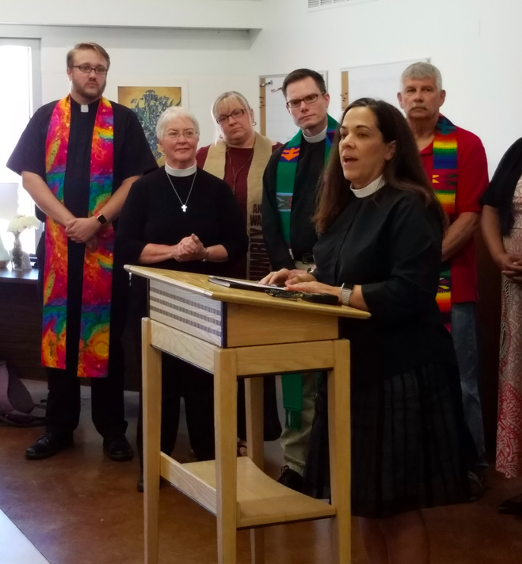
In September 2017, Pastor Angela (at lectern) joined Deacon Mary Lenn Dixon and other local clergy at BIIN for a press conference calling for immigration reform. Also shown (left to right) are Unitarian minister Aaron Stockwell, Presybyterian-UCC campus minister Amy Klinkovsky (BIIN board president in 2021-22), Pastor Trent Williams from Friends Congregational Church, and a minister from Faith UCC.
When BIIN’s leaders had first conceived of the role of “community partners,” they identified several ways for them to help the new non-profit. According to records from the archives, partners were expected to pay modest annual membership fees ($25 initially), to spread the word of BIIN’s mission and programs, and to recruit volunteers or provide other kinds of support. By 2017, financial contributions from some partners (all faith-based communities) had become a significant part of BIIN’s annual income. Yet with no formal agreement or mechanism for pledging, the funds allocated by any given partner could and did fluctuate widely from year to year, especially as the leadership, priorities and budgets of churches themselves changed. BIIN’s leaders were grateful for whatever collective or individual donations people from local churches made, especially as the board aspired to hire one or more staff members who could provide professional oversight for the organization’s volunteer-led programs.
In early 2018, BIIN hired a new part-time program manager, Jaimi Washburn, a dynamic and congenial Texas native, who had served in the Peace Corps in El Salvador and then helped to run Habitat for Humanity affiliates on the west coast for many years. Given her experience in non-profit management, Jaimi had the skills to help BIIN create the kinds of systems that the grassroots organization needed to more effectively harness volunteer time and talent, to supervise student interns, and to make the most of its limited budget. Having a skilled and reliable administrator in place for longer than a few months was a significant step forward for BIIN as an organization.
Around this same time, early in 2018, some members of St. Thomas who had contributed to BIIN in various ways, and who were aware that the organization needed stronger, more consistent financial support to enhance its work with immigrants, proposed an idea: if St. Thomas provided a venue and a meal free of charge, could BIIN organize an event to recruit sustaining members from the wider community? The board accepted this proposal, and the first “Light of Liberty” dinner was held at the parish hall of St. Thomas on May 17, 2018.
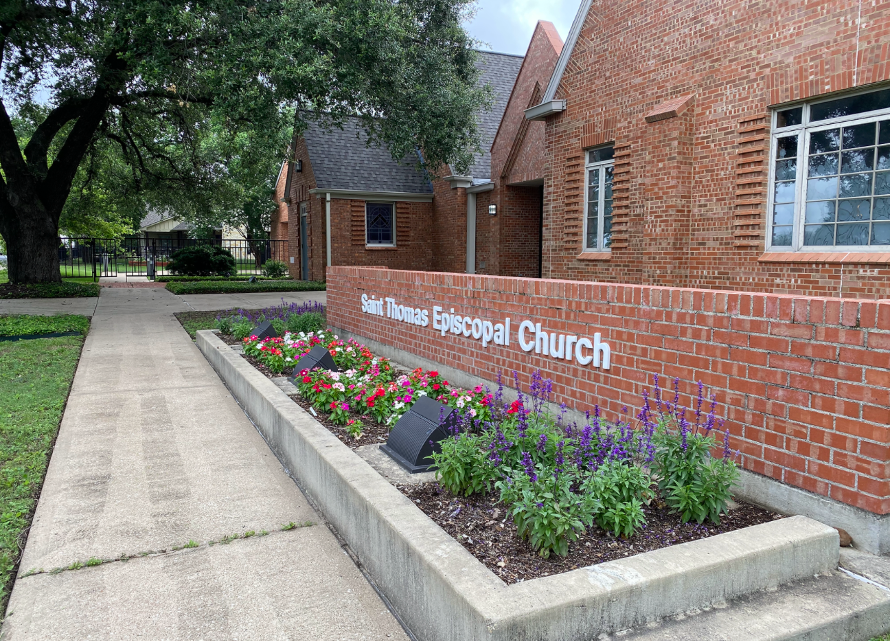
Jan Hughes, a long-time member of STEC and the spouse of Jim Hughes (who served as BIIN’s treasurer from 2016 through April 2018), was the driving force behind the team of cooks and volunteers who prepared the meal, set up the space for the dinner, and cleaned up after the event ended. There would be no charge for attending the dinner, so as not to exclude anyone, but attendees would be asked to consider making a one-time or recurring donation to BIIN. At the event, Pastor Angela Cortiñas gave an opening prayer, and Board Chair Cecelia Hawkins and Rich Woodward (a long-time volunteer who had taken on the role of treasurer that spring) each spoke about why they chose to support BIIN. According to board minutes, 60 people attended, and among them, 35 people made a one-time or multi-year pledge, producing over $4000 immediately and promises of another $25,000 to come to BIIN over a three-year period. The event was deemed a success, and the board decided to make it an annual fundraiser.
In addition to monetary gifts, members of St. Thomas and other local churches, as well as people from other parts of the community, supported BIIN and enabled its expansion by serving as volunteers or even program leaders. STEC member Rhoda Segur worked with several programs, including IRA, citizenship classes, and English for Parents. Deeply involved from BIIN’s beginnings until the summer of 2021, when she passed away, Rhoda was known and appreciated as a tireless advocate for immigrants. Rich Woodward, Chet Robinson and other members of STEC were involved in BIIN’s citizenship classes for years. The “English for Parents” program at Neal School started by Mary Lenn Dixon, as an extension of the partnership that St. Andrew’s Episcopal had created with the school, and later integrated as a BIIN program, drew many volunteers from all of the local Episcopal churches, as well as from other parts of the community. When Mary Lenn announced in 2018 that she and her husband would be moving to Austin to be closer to family, she passed on leadership of “English for Parents” to two former teachers, who also happened to be Episcopalians: Linda Ford (from St. Andrew’s) and Janet Morford (from St. Thomas).
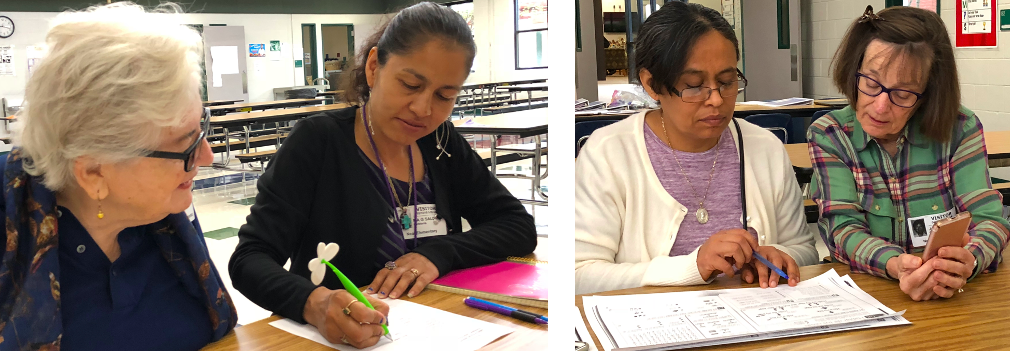
Such efforts to welcome and aid immigrant neighbors at the local level stood in marked contrast with developments at the national level. In the absence of any meaningful immigration reform by Congress, the Trump administration pressed on in its efforts to deter migration by implementing policies designed to intimidate people from seeking entry in the first place. In May 2018, the Department of Homeland Security implemented its “family separation” policy at ports of entry on the southern U.S./Mexico border. The result was a horrifying spectacle of sobbing children ripped from their parents’ arms, held in jail-like facilities, and of adults equally traumatized, and often detained or deported, without appeal. As word of the practice spread, protests and condemnations ensued, across the country and around the world. Within a month, Trump issued an Executive Order calling for migrant families seeking asylum instead to be detained together, but unfathomable damage had already been done. Despite the efforts of organizations such as the ACLU, as of December 2021, some of the children removed from their parents under this ill-conceived policy have still not been reunited with their parents, because federal agents working under Trump failed to create adequate records before separating families and/or deporting adults.
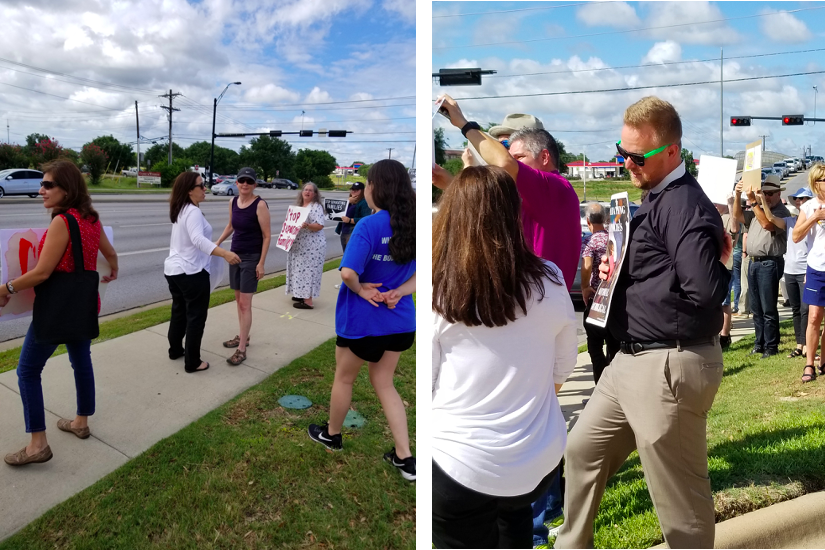
Having been thwarted from instituting “family separation” on an on-going basis and continuing to fail in its efforts to obtain Congressional funding for the long-promised “border wall,” the Trump administration persevered in trying to deter migrants from coming to the U.S., even in a legal, orderly fashion. In early 2019, the Department of Homeland Security announced a new policy, formally known as the Migrant Protection Protocol, but more commonly called “Remain in Mexico.” Under this policy, any Latin American migrant who appeared per the law at a port of entry on the southern border and requested asylum would be required to return to Mexico to wait (months, or years) for the summons to appear in U.S. immigration courts, to make their case. Although the Trump administration claimed that Mexican authorities would help ensure safe housing, work permits, etc., there was in fact no infrastructure set up to support migrants forced to remain in Mexico. While waiting for their promised court hearing, they either lived in rudimentary tent camps formed along the border or found their own places to live and work, as their resources allowed, in cities along the border. Very quickly, it became apparent that the policy was simply exposing migrants, many with young children in tow, to inhumane and dangerous conditions: living outdoors, with poor sanitation, no way to support themselves, and thus all the more vulnerable to organized crime, sexual assaults and economic exploitation.

As knowledge of what was happening along the U.S./Mexico border spread, many advocacy groups and faith-based organizations began to look for ways to witness and protest the inhumane treatment of migrants forced to remain in Mexico, or to stay in substandard ICE detention facilities for months at a time, without access to legal counsel. Under the auspices of the Episcopal Diocese of Texas, a witness mission to the border for clergy was held in the summer of 2019. One of the mission’s participants was Deacon Charlotte Love, a long-time member of STEC who, recently ordained, had begun serving the Episcopal parishes in B/CS.
In a sermon given at St. Thomas on August 4, 2019, Deacon Love described what she had seen in several places, including in Matamoros, the site of one of the largest migrant encampments created by the “Remain in Mexico” policy. She reported the fatigue and fears of migrants, and the compassion and generosity of volunteers who offered food and water to those forced to wait. Relating this situation to the Christian call for “radical hospitality,” Deacon Love then reminded church members:
In our baptismal covenant, we have vowed… to seek and serve Christ in all persons, loving our neighbor as ourselves, and to strive for justice and peace among all people, and to respect the dignity of every human being… Yes, immigration is complex, but while we’re figuring it out, we have been mandated by Jesus Christ: to feed the hungry, give water to the thirsty, clothe the naked, and to love our neighbor as ourselves.
Around this time, Pastor Angela Cortiñas also felt compelled to address from the pulpit the inhumane treatment of people seeking safety, refuge and asylum, according to the rules of law, at the southern border. As she explained,
I had heard from other clergy about the atrocious environment our brothers and sisters to the south of us were experiencing. How could I not respond? How could I not encourage others to do what is required of them? That is what is required of me both as a minister and as a fellow pilgrim and believer. I also believe we have a civic and Christian duty to stand up for those who need a voice, to seek justice for those who are experiencing oppression and violence, and that means standing up to leaders when I disagree with their policies.
While Charlotte Love’s report from the border had raised some eyebrows, Pastor Angela’s sermons elicited complaints and led to vocal pushback by some members of the parish. Looking back, she commented, “I think most folks felt challenged and still appreciated my sermons. However, there were a few who did not agree and subsequently chose to leave the church because of it.” Realizing what was at stake, Pastor Angela took the initiative to organize a series of open discussions around “difficult topics,” including but not limited to immigration. The response to this invitation was heartening:
They were some of the best attended adult formation events we ever had, with 25-40 people in attendance. Everything from immigration to gun violence was discussed. The feedback was overwhelmingly positive. I think most parishioners enjoyed having healthy discourse over difficult matters in the context of our Christian beliefs and duties.
Building on these discussions and continued news of backlogs and suffering imposed on asylum seekers at the southern border, many people sought ways to support and show solidarity for people forced to “remain in Mexico” while awaiting their turn in US immigration court. In February 2020, a group of 14 people from central Texas, including Pastor Angela and five parishioners from St. Thomas, joined in a short mission trip to Brownsville/Matamoros, organized by Deacon Charlotte Love.

The group worked with Team Brownsville, a grassroots organization which by then, in partnership with World Central Kitchen (an international aid organization), had set up a remarkably efficient system of preparing, delivering and serving hundreds of hot meals each day to asylum seekers living in the Matamoros tent city. Under the guidance of professional chefs and humanitarian aid workers, volunteers used a Brownsville church kitchen to prepare and pack trays of healthy food into foam crates (designed to keep food hot or cold, as needed). The organization delivered the crates to the downtown bus station, where the crew of volunteers would reassemble, load them into wagons, and walk them across the international bridge.

On the other side, a giant tent had been erected by World Central Kitchen in the middle of the tent city, and furnished with folding tables and chairs. Volunteers, working with some of the local “residents,” would then serve the evening meal, and hand out a breakfast/lunch sack meal for the next day. The mission trip was short, but enabled volunteers to contribute to the daily cycle of food preparation, transport and service, and to process what they had witnessed. Janet Morford, one of the STEC members participating, recorded these observations of the evening meal:
It was clear that people were hungry not just for food but for recognition of their status as fellow human beings. From my post in the serving line, I made a point of making eye contact with each person, smiling and saying, “Buen provecho!” Many people responded with kind words, thanking me in Spanish or in English for being there.
What I saw as people moved through the line was nothing like the horrors proclaimed by immigration opponents, but instead, simply ordinary people making the best of a difficult situation. As people finished their meal, some sat at tables talking with others. Children jumped up and resumed games of chase or ran outside. Someone put on some music and a few people danced in the open space at one end of the tent, which felt like a little island of warmth and decency in the midst of material misery.
What did we witness in this place? We saw kindness and forbearance, resilience and hope. We saw people waiting patiently, bearing discomfort, injustice and danger, for a very slim chance at what all of us ultimately want: a safe place in which to live, work, raise children, and feel that we belong.
Participants of this mission trip (and no doubt many more like it) returned to their home communities eager to bear witness to what they had seen and talking about returning again soon with another group of volunteers. However, seismic change was just around the corner, with the global spread of the coronavirus pandemic.
In the Brazos Valley, it was during the week of spring break in mid-March 2020 that schools, colleges, workplaces and all but “essential services” were first locked down. Faith communities were also traversed by the public health crisis, and for many at St. Thomas Episcopal, the threat posed by this new virus felt particularly dire. Angela Cortiñas explains:
The pandemic started while I was away on a pilgrimage to Scotland with some parishioners. Two days after returning I started with symptoms of COVID and was diagnosed just 24 hours later. I am thankful that St. Thomas had a curate that could lead worship and an excellent and capable staff that could carry on while I was recovering from COVID. I was one of the early cases in Brazos County and at the time, it was quite frightening with all the news and the death rates that were being reported. I had the full spectrum of symptoms including shortness of breath, extreme fatigue, loss of sense of smell and taste, and running a fever. To say I was scared was putting it mildly. Others were worried as well, and I am thankful for the neighbors, friends and family that called, dropped off meals and groceries… Thankfully, I made it through. That was the first obstacle.
It’s one thing to recover from serious illness at a time when the virus was barely understood. It’s another to be responsible for leading a faith community through a crisis that upends the very structures and habits of an institution that people turn to in times of need. Again, Pastor Angela:
We had to learn new ways of doing worship and work through the challenges of providing meaningful worship virtually: first with Zoom, learning what worked and didn’t, and then through live-streaming. Raising funds for the equipment, writing grants, getting PPP loans, not being able to visit some of our most vulnerable members, learning new technology, dealing with supply and demand issues and whether to mask or not to mask, and how and when to begin to gather. Then throw in the politicizing of everything related to the pandemic and the polarity that was created and that trickled into the STEC community — it was exhausting. I was visited and called by several parishioners who were unhappy about any number of things. Suddenly, folks were saying that if we did not start worshiping in person soon they were going to leave… The fear and anxiety were palpable… Pastors everywhere felt the burden of caring for their flock while dealing with their own issues of exhaustion, pressures of church decline, walking the politics of the pandemic, caring for their own families and selves while trying to maintain hope and positivity with all the negativity around them.
In time, most people adjusted to the “new normal.” Just as at BIIN, where classes and programs moved online, at St. Thomas, parishioners learned to use Zoom and to check in with each other during daily compline (evening) services and online coffee hours. Blessed with a large shaded campus, STEC was the first Episcopal church in the B/CS area to start having in-person services, youth group and gatherings outside in the summer of 2020, while following safety protocols from the CDC and the Episcopal Diocese of Texas. As more was learned about transmission, services indoors resumed, with masks and social distancing required, and livestreaming of services continued for those who did not want to gather in person. Looking back on this time, Pastor Angela felt much had been achieved:
In the end, I am most proud of the fact that we took the risk to open and gather with safe protocols in place. I think STEC and the St. Thomas Early Learning Center were perfect examples of how we can gather and continue to do the work of the gospel through one of the most difficult times in our history. Even through all this, we had one of the most successful stewardship campaigns in 2020, we were able to raise funds and install the beautiful new church doors, and complete 2020 with incredible support for many of St. Thomas’ outreach ministries.
Indeed, in 2020, members of St. Thomas contributed to a massive food drive benefitting the Brazos Valley Food Bank, the church made grants to the food bank, the B/CS Habitat for Humanity affiliate, and to BIIN, and many individual members made donations to BIIN and/or the BIIN CARES Fund.
Long-time volunteers Rich Woodward and Rhoda Segur adapted and continued to serve BIIN and its programs as they had for years, as citizenship classes moved online and the IRA team adopted new protocols for working with clients. While the closure of schools to outside visitors forced the suspension of “English for Parents,” Janet Morford (who had joined the BIIN staff on a part-time basis in late February 2020) worked with BIIN interns and former English for Parents volunteers to create a family-friendly online alternative, “Allies in Action,” which emphasized digital literacy skills as well as opportunities to practice using English. The wellspring of support for the BIIN CARES Fund in 2020 demonstrated that many people from across the Brazos Valley and beyond were eager to love their neighbors in need, and prompt to respond to inequities made all the more apparent by the pandemic.
By changing its habits and continuing to work outside its walls, St. Thomas Episcopal weathered the storms of 2020 fairly well. However, the faith community faced another unexpected transition in early 2021, when Angela Cortiñas left to take a new position at a church in Austin. As she explained,
I left St. Thomas knowing I had given all of myself to it and I am proud of all we did together. I came to St. Thomas right after a beloved rector died, I started my ministry with the disastrous effects of Hurricane Harvey, and ended with getting St. Thomas through some difficult pastoral and challenging times… I never expected to leave St. Thomas in 4 years but God had other plans for me and for St. Thomas. I am so excited and happy about the call that was made [to a new rector] and believe God has great things in store for St. Thomas.
To honor the ministry of Pastor Angela, the STEC vestry and parish rallied around a campaign to give to local non-profits in her name: in February 2021, members of the parish donated over $11,200 to organizations across the Brazos Valley, of which $2350 were given to BIIN or the BIIN CARES Fund. It was a fitting tribute to a passionate pastor who believes that “outreach is just as important, if not more, than just showing up [for church] on Sundays.” As Pastor Angela affirmed:
Wherever you go and where ever God calls you…the promises we made at our baptism remain the same: to seek Christ in all persons, loving our neighbors as our ourselves, to strive for justice and peace among all people and to respect the dignity of EVERY human being.
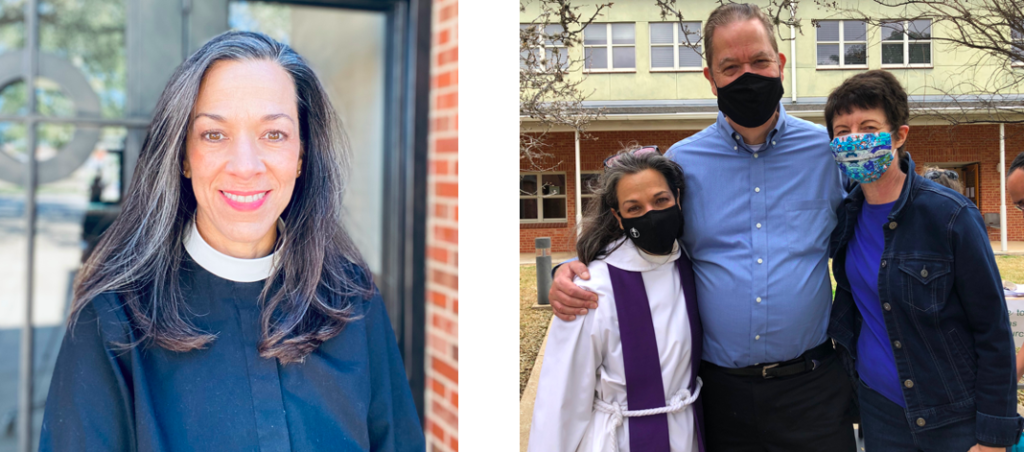
The past ten months have been an important period of transition for St. Thomas Episcopal Church, as the parish has followed diocesan guidelines for self-study and search, and finally made a call to a new rector, Rev. Korey Wright, who will assume this role in early January 2022. Having to rely more extensively on lay leadership during this time, members of the parish have expressed surprise and pride at what the church has been able to do, in particular through a stewardship campaign that challenged everyone to give of their time and talent (to the church and/or to its various outreach ministries) as well as their financial resources. As Senior Warden Tara Wilson explained,
During this transition period between rectors, our members have stepped up and taken active roles to ensure that our ministries within our church and to the broader community continue. This year for our stewardship campaign we adopted the slogan “We Are the Church,” and our members have personified that with their gifts of time and talent. More people have volunteered their time this year than ever before. As a community we recognize the church is not a reflection of, nor dependent upon a rector – the church is us: our beliefs, our actions and our love.
As members of St. Thomas are encouraged to put their faith into action by actively supporting or joining local organizations that provide services to people in need, there are many initiatives eager to have their help. In view of numerous compelling options, what leads an individual to support a specific organization rather than another? From the perspective of STEC vestry member Nancy Juvrud Mason, such decisions are often deeply personal:
Sometimes, people get involved in outreach for a cause that is near and dear to them. Sometimes, they are responding because a need is brought to the forefront. Rhoda Segur, for one, shaped a lot of us. She got many of us involved, by never taking “no” for an answer.
In other words, faith communities can be fonts of support for local non-profits because they are places that people turn to as they seek to be part of deeper relationships and to make sense of themselves in relation to the wider world. As individuals become enmeshed in a faith community, they may also be inspired by it to become involved in organizations that it supports in the broader community. As STEC member Jan Hughes notes,
Over the past 10 years, STEC has continued to support many charitable activities in the community. However, BIIN has a distinct status in that STEC’s support for BIIN has been constant and broad-based among our church community.
For some members of STEC, as for other local churches, there is clear and compelling overlap between the missions of the church and of BIIN. According to Senior Warden Tara Wilson:
The mission of STEC and the mission of BIIN are related – both recognize and champion the dignity of every human being. Both the Old and the New Testament call for us to help the poor and the marginalized. The Old Testament calls for justice for the foreigner, and Christ calls for us to love our neighbors as ourselves. Immigrants are our neighbors and if they are in need, we have a Christian obligation to provide love and assistance – this is how we show that we “know Christ’s love and make it known in our community” (as the STEC mission says).
Fellow parishioner Jan Hughes, also a long-time volunteer and donor to BIIN, explained her support for the organization’s work in similar terms:
My faith spurs me to support BIIN. As a follower of Jesus, I believe I am serving Christ when I serve anyone who is hungry, afraid, vilified, or lonely.
Perhaps most powerfully, what organizations like BIIN offer to volunteers and donors (as well as to clients and program participants) is the chance to develop relationships with a wider range of people and in so doing, to be reminded of the fundamental humanity that we share with others, including those whose paths to this time and this place may diverge from our own. This opportunity to connect and to interact with others, despite initial differences in language and background, is even more precious in these times of increased isolation and division. Hearing others’ stories can also remind us of just how fortunate we are to live the lives that we do, and can give us reasons to reconsider our own priorities. Rich Woodward explained his long-standing commitment to BIIN in such terms:
I love working with BIIN. There is nothing more rewarding than serving brothers and sisters in the Hispanic community. I am fortunate that I can speak Spanish, which allows me to interact with the wonderful people in our community who have lived here for decades but have not yet become citizens or mastered English. These are truly wonderful people, hardworking, loving and fully committed to becoming citizens — a privilege that most of us who live here simply take for granted. These people inspire me. What more could you ask for?
In coming months, we will continue to explore the histories and contributions of other organizations who support BIIN as community partners. If you have stories to share or know who would be able to share perspectives on other organizations’ connections with BIIN, please reach out to Janet Morford at janet@brazosimmigration.com.
